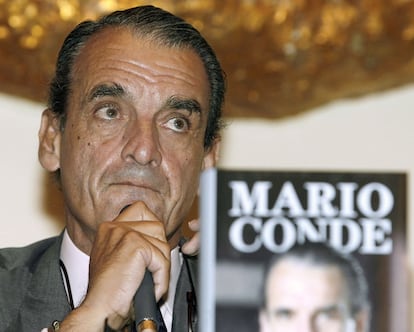Ex-banker Mario Conde arrested for transferring ill-gotten gains
Another seven people have been detained in operation, including one of his children

Spanish police have arrested Mario Conde, the disgraced former chairman of Banesto, charging him with laundering money held in Swiss bank accounts he embezzled from the bank in the 1980s and 1990s back to Spain. On Monday police searched a number of Conde’s homes in Spain, along with businesses set up by him.
Civil Guard sources say that seven other people have been arrested as part of the operation, among them Conde’s daughter Alejandra.
Conde’s arrest comes 23 years after he was exposed for illegal appropriation of Banesto funds and 11 years after he was released from prison
Conde’s arrest comes 23 years after he was exposed for illegal appropriation of Banesto funds and 11 years after he was released from prison.
The Bank of Spain took over Banesto in 1993 after it almost collapsed, removing Conde from its helm. A €2.7 billion shortfall was eventually discovered on its books, and it was later bought out by Spanish lender Santander.
Conde was initially jailed for embezzling €3.6 million from the bank and sentenced to four years in prison in 1999. He was paroled after 17 months, but was again sent to prison in 2002 after a 36-month-long trial, the longest in Spanish history, for fraud, misappropriation of funds and falsification of public documents in connection with the mismanagement of Banesto during his six years as bank chairman.
The Supreme Court ruled at the time that Conde had not fully accounted for the money he had embezzled, which had allegedly been funneled into a Swiss bank account held by Argentia Trust, among others.
The man once described as “Spain’s Gatsby” had allegedly set up a complex web of companies to repatriate the embezzled money
The current investigation, overseen by the High Court and carried out by anti-corruption agents, charges Conde with money laundering and using a false identity. The man once described as “Spain’s Gatsby” had allegedly set up a complex web of companies to repatriate the money embezzled from Banesto from Switzerland back into Spain.
Police sources say that over the last decade 68-year-old Conde had so far managed to bring some €10 million into Spain by this means.
They add that among the methods allegedly used by Conde were a series of fake loans between front companies, as well as bogus capital increases, as well as using figureheads, among them his daughter Alejandra.
Anti-corruption agents say that Conde was arrested after traveling to Seville, where he was attending the annual spring fair, and will appear before a High Court judge on Wednesday. They say they have discovered a number of properties belonging to Conde in the province of Seville, as well as in other areas of Spain. He also owns a house in an upscale area of Madrid as well as luxury properties in the Balearics and Galicia.
After being paroled from jail for the first time, in 1999, Conde entered politics, running as an independent in the March 2000 elections.
But he soon found himself under investigation, and was sent to prison again in 2002. He was released from jail in 2005 after serving 11 years of a 20-year sentence. In 2012 he ran for office again, this time in his home region of Galicia. But that same year, the High Court ordered five of his properties, which had been registered in other people’s names, to be embargoed.
He now faces a further prison term, this time for money laundering and using a false identity.
English version by Nick Lyne.
From humble origins to the high life
The son of a customs officer, Conde was brought up in Galicia, and after finishing university became a state lawyer. He made his fortune from the sale of a friend’s pharmaceuticals company, using the proceeds to purchase a stake in Banesto, and then becoming chairman in 1987.
Elegantly dressed and with his trademark slicked-back hair, Conde was a regular figure in Spain's gossip magazines and became a symbol of the new, confident Spain of the 1980s. He was photographed sailing with the royal family, dancing sevillanas with the jet set, and also threw extravagant parties for the country's financial elite.
Under his administration, Banesto invested heavily in the media, increased lending and reported big profits.
But as it later emerged, the deal-making at Banesto and its business units enriched Conde and his cronies, but left the bank near to collapse. During his trials, Conde claimed it wasn't his investment decisions that landed him in court, it was his decision to enter politics.
He asserted in his autobiography that he had been the victim of a conspiracy between the Spanish Socialist Workers’ Party (PSOE) which was in power throughout most of the 1980s and 1990s, and the establishment, which was determined to block his supposed attempts to shake up the system.
Tu suscripción se está usando en otro dispositivo
¿Quieres añadir otro usuario a tu suscripción?
Si continúas leyendo en este dispositivo, no se podrá leer en el otro.
FlechaTu suscripción se está usando en otro dispositivo y solo puedes acceder a EL PAÍS desde un dispositivo a la vez.
Si quieres compartir tu cuenta, cambia tu suscripción a la modalidad Premium, así podrás añadir otro usuario. Cada uno accederá con su propia cuenta de email, lo que os permitirá personalizar vuestra experiencia en EL PAÍS.
¿Tienes una suscripción de empresa? Accede aquí para contratar más cuentas.
En el caso de no saber quién está usando tu cuenta, te recomendamos cambiar tu contraseña aquí.
Si decides continuar compartiendo tu cuenta, este mensaje se mostrará en tu dispositivo y en el de la otra persona que está usando tu cuenta de forma indefinida, afectando a tu experiencia de lectura. Puedes consultar aquí los términos y condiciones de la suscripción digital.








































